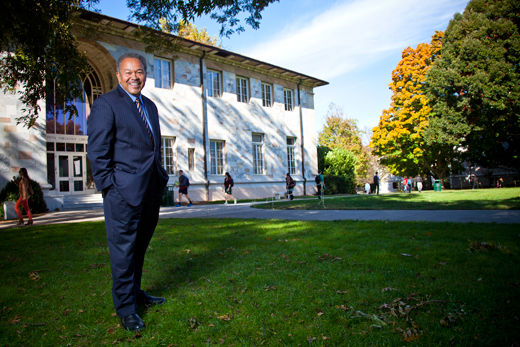As the world lays to rest former South African President Nelson Mandela in his home village of Qunu, Emory's Robert Franklin, senior adviser for community and diversity to the provost, is calling for others to commit themselves to what he calls "practicing Madiba," which he first outlined at a remembrance of Mandela held on campus this week.
"Thanks to his recognition that we are interdependent, the ethical core of Ubuntu, we can only appreciate Mandela in the context of his clan, his village," says Franklin. "He is Madiba, so we cannot deify him without lifting the women and men who stood with him.
"My fundamental belief is that we should commit ourselves to 'practicing Madiba," Franklin says. "My field is social ethics, and I am interested in mobilizing arguments and agents to improve the quality of human community through adherence to principles of justice, fairness, inclusion and enabling the self-fulfillment of all people.
According to Franklin, practicing Madiba means three things.
1. Practicing Madiba is an intellectual mandate.
"It is the art of discovery and learning and the courage to change one's mind in the face of new evidence and stronger arguments," says Franklin. "For many years, Mandela rejected the social analysis and political agenda of communism. His Christian values and his suspicion of foreign philosophies closed his mind to it."
But Mandela met people whose lives deeply impressed him. "When he saw communism embodied and practiced by courageous friends, he realized that he must learn more about what animated them," says Franklin. "He bought the collected works of Marx, Engels and others and read them. And, as a true intellectual, he began a dialogue with new sources that led to a new openness to those whom he had rejected before."
After becoming president, however, Mandela moderated his views again, making what a recent New York Times story called a "complicated journey to support free markets and a free economy."
While in prison, Mandela also learned Afrikaans "because he wanted to have the key capacity of the intellectual in a diverse society," says Franklin, including "the ability to listen and speak across cultural chasms, the ability to be bilingual and multilingual, and to move eventually from being culturally literate to culturally fluent.
"Practicing Madiba requires that we keep open minds, and restless hearts for justice, fairness and opportunity for the least advantaged members of society," says Franklin.
2. Practicing Madiba is an ethical challenge.
"He was a transformative moral leader not because he was perfect," says Franklin. "He begged us not to transform him into a symbol because he was a flawed human being risking large things.
"He did not have to talk to his former enemies. He did not have to seek reconciliation with DeKlerk. But, he did so because that is what moral leaders do," Franklin points out. "They act with integrity on behalf of the common good."
After the prisoner became the president, says Franklin, he initiated the Truth and Reconciliation process, "a process that would take the nation and individual souls through the depths of hell and agony, but might lead to a deeper healing and the possibility of a better future.
"Practicing Madiba may lead you to use unconventional methods, develop unlikely partnerships, and engage in unpredictable dialogues in order to advance the common good," says Franklin. "He was criticized for talking to controversial leaders. But, that is the risk that moral leaders take.
"Practicing Madiba is about transparent communications that may involve taking risks to produce breakthroughs."
3. Finally, practicing Madiba is a practical social change process.
When he was incarcerated, black prisoners were not allowed to wear long pants but were given shorts like children, says Franklin. "Black prisoners were not allowed to have white sugar but given brown sugar instead. Apartheid was a heinous social system with vicious law and policy, but it was also a collection of micro-assaults and micro-aggressions on black dignity.
"But Mandela met each one with dignity,'' says Franklin. "He transformed the situation through micro-resistance and micro-reconciliation."
Mandela's example provides wisdom for the larger community, says Franklin. "We can transform aggressions with respectful resistance and a commitment to truth and reconciliation."
Franklin, who returned recently to Emory for the third time, previously has served as the university's Presidential Distinguished Professor of Social Ethics, as director of Black Church Studies at Candler School of Theology, and as a senior fellow at Emory's Center for the Study of Law and Religion.

